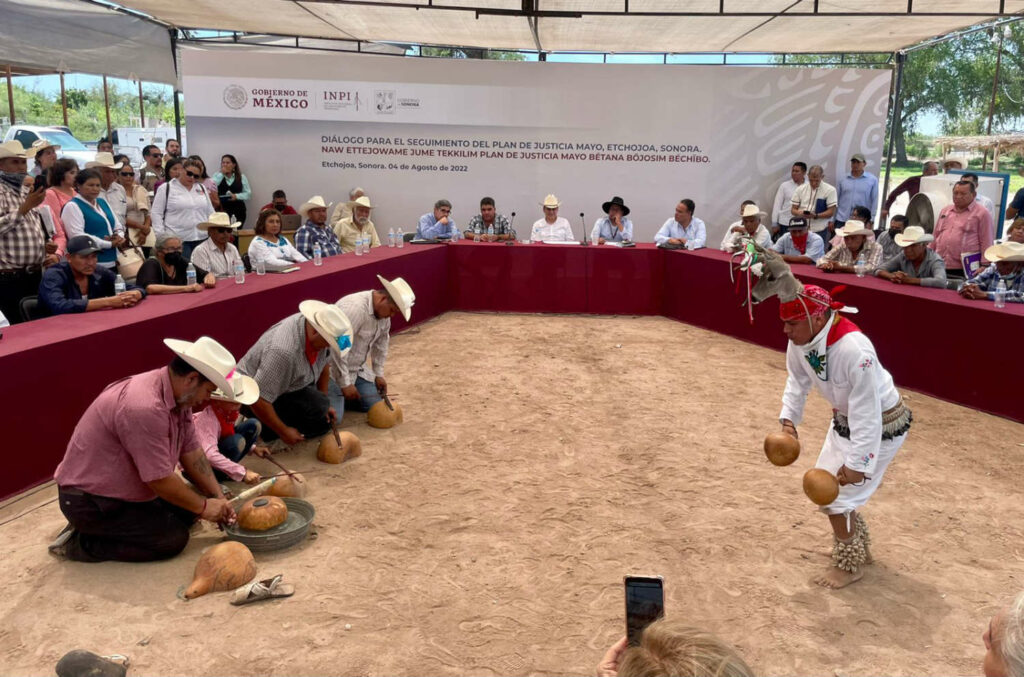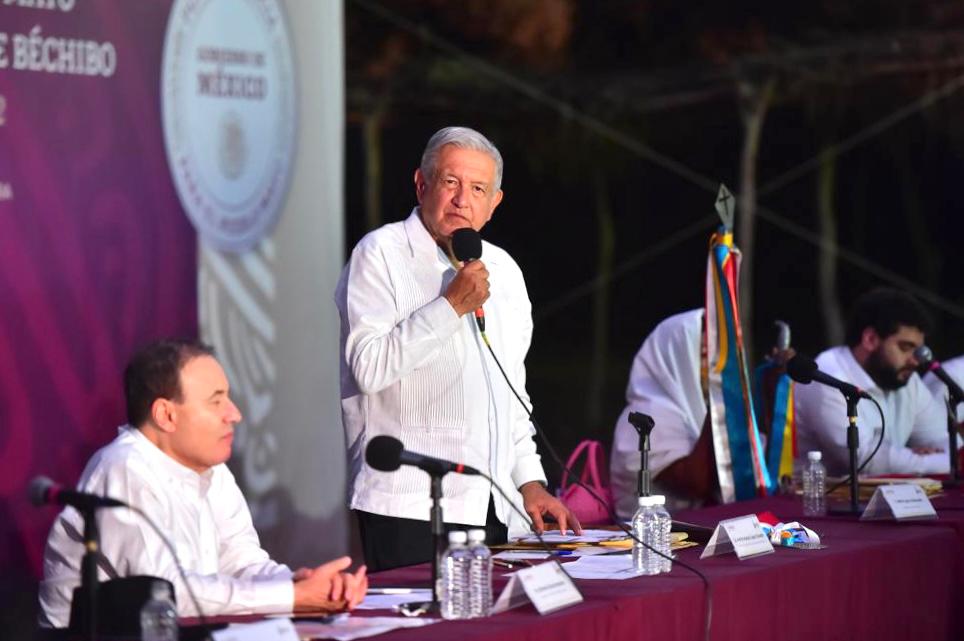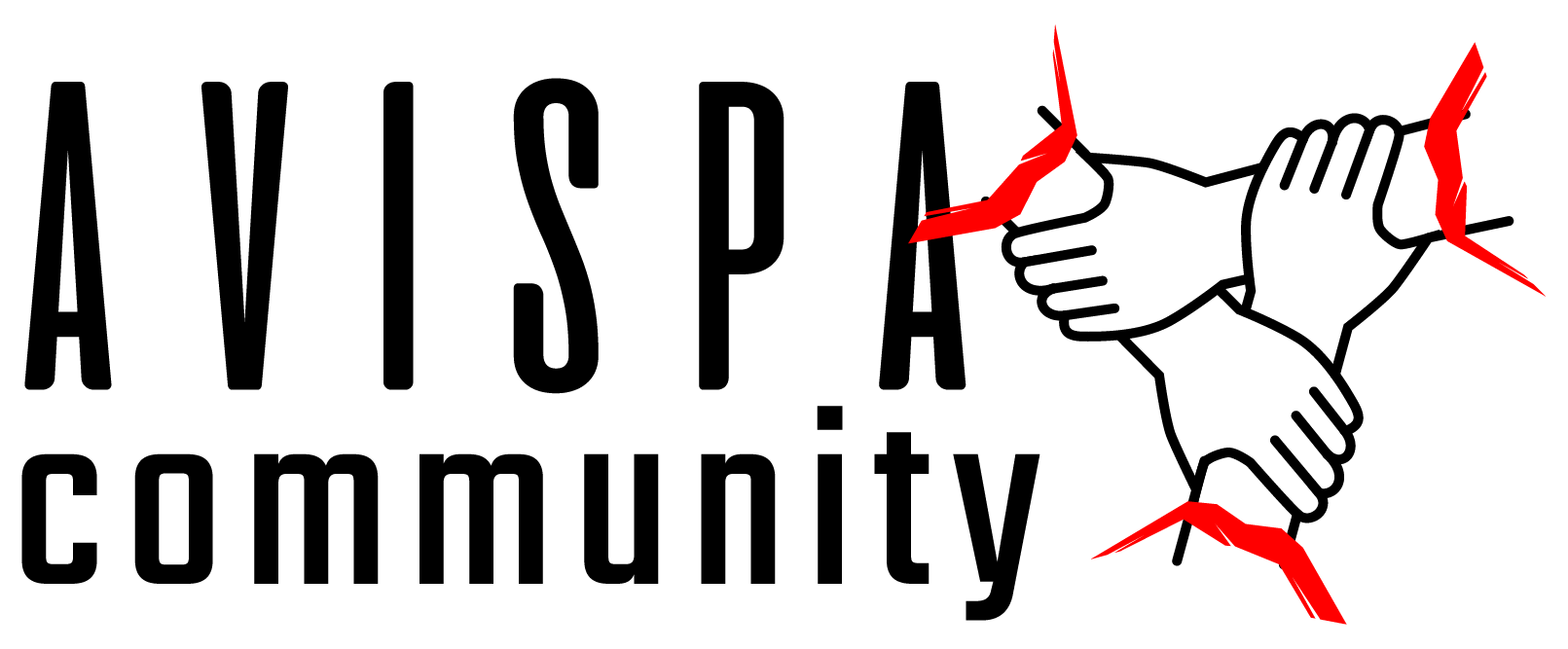Meeting between federal and state officials related to the justice plan of the Mayo people.
Myrna Valencia, professor and human rights defender, member of the Mayo-Yoreme community of Cohuirimpo in southern Sonora, is firm in asserting that the so-called justice plans being pushed by the administration of Andrés Manuel López Obrador are detrimental to the Indigenous peoples of Mexico.
As a strategy to promote its policies with Indigenous peoples, the government of the “fourth transformation” (or the 4T as it is popularly known) has coordinated talks with different communities. According to the General Director of the National Institute of Indigenous Peoples (INPI), Adelfo Regino Montes, these talks “will allow us to know and respond to the just demands and historic necessities of Indigenous peoples.”
The federal government is holding meetings with members of the Yaqui, Séri, Wixárika, Náyeri, O´dam, Guarijío, and Mayo-Yoreme people, to whom they have announced the implementation of these so-called justice plans. The promises for the Yoreme tribe include the recuperation of the Mayo River and access to the water; the construction of highway and hospital infrastructure; and the resolution of agrarian conflicts, among others.
You might be interested in- Yaquis: Between Government Forgiveness and Pressure for the Pipeline
Valencia, who is also part of the Indigenous Governing Council (CIG) of the National Indigenous Congress (CNI), critiques the official statements arguing that the strategy of the federal government is just more of the same: “The justice plans, especially for us, the Yoreme, are just harassment and the coup de grace,” she says, denouncing the cooptation of community leaders and the electoral use of government assistance.

Her testimony complements those of inhabitants of the communities of Bachoco El Alto, Buaysiacobe, Masiakawi, and Cohuirimpo, who came together in the Alianza Yoreme or Yoreme Alliance, in January of this year, to denounce that their “ancestral existence is at serious risk due to the resounding failure of the indigenist policies implemented by the Mexican government.”
Through a statement, the alliance in northern Mexico argued that “the 4T is the ideal instrument of capitalism. Businessmen, political parties, organized crime, and other de facto powers all blend together perpetuating themselves in political power, directing anti-identity actions such as drying up the Mayo River in the territory of our tribe.”
For Myrna, the cultural component of the Mayo people is fundamental to the organizing work in the communities. For this reason, she emphasizes that the approach of the peoples of the alliance is to denounce the state for their actions that seek to negate their identity.
“Because when the Yori government, the white government, says ‘this community isn’t Indigenous anymore,’ it has an effect,” she mentions criticizing the creation of the National Catalog of Indigenous and Afromexican Peoples and Communities. INPI, who created the national catalog, has argued that it is necessary in identifying the different peoples in order to guarantee the full exercise of their rights.
This publication is part of a series of dialogues with participants in the last assembly of the National Indigenous Congress in Tehuacán, Puebla. You can consult the past posts on other resistance struggles in the Isthmus of Tehuantepec, Michoacán, and Quintana Roo.
Below, we share the testimony of Myrna Valencia who is also a member of the Indigenous Governing Council of Cohuirimpo Rio Mayo, one of the eight towns of the Mayo-Yoreme tribe, whose territory spans a region between southern Sonora and northern Sinaloa.
Avispa Midia (AM): In the working groups you talked about the so-called justice plans being pushed by the federal government. Can you share with us more details?.
Myrna Valencia (MV): We have sadly seen that this is just more of the same. In 2019, the president made his first advances. A diagnostic was carried out among Indigenous authorities of the different peoples, communities, and leaderships. We had the opportunity to attend and the diagnostic was very clear. However, we weren’t very clear on what the diagnostic was all about, nor of the economic benefits that would be offered to those who seek out economic resources and political positions. The people were honest in saying how they felt. ‘We want land, we want our land legally recognized. We want our territories and we want our water.’ That was the general sentiment that we delivered.
AM: How have things advanced with the state?
MV: They began to carry out meetings. The INPI and other organizations, who say they are representatives of Indigenous peoples, they began to make incursions, imposing themselves in the communities, naming Indigenous authorities in their own interests and convenience, authorities that would favor them. It was that clear. There has been a lot of differences with the authentic Indigenous governments. They have not been respected. There have been certain individuals, I remember Juan Pérez Gil, who claims to be the spokesperson for the 8 governors of the 8 towns. There has never been such a thing, never talked about, much less legitimized.
As intermediators, they have benefitted from the resources of the justice plan allowing them to manipulate the will of the people. It allows them to take advantage of the necessities of the people, to convince them of things to come. They only know how to act in electoral matters. They are already preparing for the upcoming election, that is what this has served.
It is a platform for electoral questions, for positions of local and municipal government, and even in the institutions like INPI and CEDIS (Commission for Attention to Indigenous Peoples of Sonora) which work on Indigenous issues in the state. That is what we are experiencing, what we are suffering from. In reality there is no progress. In May of 2022, the president said something like: ‘I know what you want, I am not going to fight with those who have the land, I am going to compensate you for it. I am going to fulfill my commitments with you all.’ The people applauded, it was euphoria.

But sadly, there have been meetings, workshops, and roundtables on different topics. Our people are not accustomed to this. In the meetings, there are people who are not informed and other people who are misinformed. So, the working groups, workshops, and meetings are far from what the Indigenous communities, what the Indigenous people need. In so much coming and going, the object has been lost. We have the responsibility and consciousness because we have been there from beginning. We have had to participate, with a lot of shame because we realize how the people’s will is being managed.
Access was not allowed if you were not a governor (traditional figure of the Yoreme peoples). Obviously, those who are at the front acting as representatives of the tribe and administrators of the budget, they recognized whoever they wanted. It was then that we declared ourselves an alliance and began to reply, criticize, and say clearly that this is a farce, just more of the same.
AM: One of the promises being made is related to the recuperation of the Mayo River. Has that work already begun?
MV: If they really wanted to they would have begun by giving the ration of water that is detained in the dams and benefits the large landowners. It has been years since the necessary ration (of water) has been left in the river, and the plant and animal species are going extinct.
Our territories are dry. The people who lived on the edges of the river are even being affected because concessions were given to these inhabitants. They had access to a certain amount of the riverbed toward the banks. But now as the riverbed has decreased with barely a trickle of water, their houses are now outside the concession. Even so, the government is charging them taxes.
The river, that is one of the most important elements of our identity as a tribe, and it is dry…we continue being treated as foreigners in our own territory, led to a way of thinking that undermines diversity.
AM: What do you think is important about this event that has brought us all together?
MV: Organization is the foundation. No one from an external government will come and take stock of what is hurting us, much less resolve our problems. When someone from outside comes and says that they are our representative, like the white government for example, the only thing they do is take advantage of the resources from our taxes.
But the organization, in this case, the National Indigenous Congress that brings us together on this occasion, and that animates us to organize, I believe that it is the best thing we can do as Indigenous peoples, as people with an identity of a native people. It allows us to know personally, up close, the pains we suffer as people, that we suffer as communities.
Here, comunalidad is the trait that is promoted, recognized, and that which makes us feel truly proud. Here we live it, we express it, we manifest it, and we take it home with us, thanks to the principles of command by obeying of the National Indigenous Congress and the commitment that we have as an Indigenous Governing Council in forming, implementing, and organizing this form of self-government of our tribes.



Hola, he leído tu muy buen artículo. Soy Yoreme-Mayo y vivo en Arkansas, EE. UU. Estoy tratando de mantenerme al día con las noticias de Sonoro y Sinaola y Yoreme-Mayo junto con las otras tribus indígenas. No tengo ningún contacto personal con quien pueda mantener correspondencia en México. Te leí artículo con Myrna Valencia. Me gustaría mucho tener su información de contacto. ¿Puedes ponerme en contacto con ella? Aquí está mi correo electrónico si usted y ella desean contactarme nuevamente. Quiero apoyar a mi tribu en todo lo que pueda o ayudar en todo lo que pueda.
Mi nombre es Kathleen Torraco.
torracokat@gmail.com
Solo hablo inglés, así que tengo que usar el traductor de Google para comunicarme.